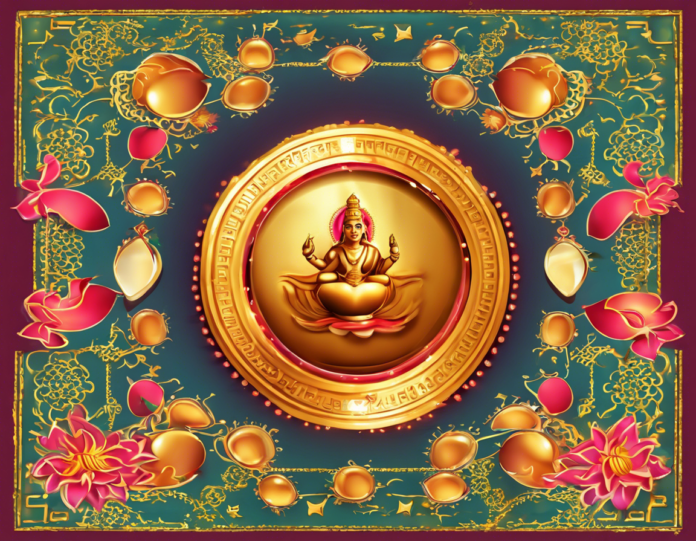Dhanteras, also known as Dhanatrayodashi or Dhanvantari Trayodashi, marks the first day of the five-day-long Diwali festival. The word “Dhanteras” is derived from the combination of the words “dhan,” meaning wealth, and “teras,” referring to the thirteenth day of the lunar fortnight. On this auspicious day, it is believed that purchasing gold, silver, utensils, or new items brings good luck and prosperity. People also worship Lord Dhanvantari, the god of Ayurveda, seeking blessings for good health and well-being.
Dhanteras Rituals and Traditions:
On Dhanteras, people wake up early in the morning, take a bath, and adorn new clothes. They clean their homes and decorate them with rangoli and colorful lights. In the evening, a traditional puja is performed to honor Goddess Lakshmi and Lord Kubera. Here are some common rituals and traditions observed on Dhanteras:
1. Cleaning and Decoration: Cleaning the house and decorating it with colorful rangoli designs and diyas is a common practice to welcome Goddess Lakshmi and invite prosperity into the home.
2. Buying Precious Metals: It is a popular belief that purchasing gold, silver, or new utensils on Dhanteras brings wealth and fortune to the household. People flock to jewelry shops to invest in these metals on this auspicious day.
3. Lighting Diyas: Lighting earthen lamps or diyas is a significant part of Dhanteras celebrations, symbolizing the triumph of light over darkness and the dispelling of negativity.
4. Performing Lakshmi Puja: In the evening, a puja is conducted in honor of Goddess Lakshmi, seeking her blessings for wealth and prosperity. Prayers are also offered to Lord Kubera, the treasurer of wealth in Hindu mythology.
5. Reciting Mantras: Chanting sacred mantras and hymns dedicated to Goddess Lakshmi and Lord Kubera is believed to invoke their blessings and attract abundance into one’s life.
Dhanteras Significance:
Dhanteras holds immense significance for Hindus. It is believed that on this day, Goddess Lakshmi emerged from the ocean of milk during the Samudra Manthan (churning of the ocean) alongside Lord Dhanvantari, the divine doctor. Here are a few key reasons why Dhanteras is considered auspicious:
1. Wealth and Prosperity: Dhanteras is associated with the worship of wealth and prosperity. Buying new items or precious metals signifies an investment in prosperity and attracts good fortune.
2. Health and Well-being: Lord Dhanvantari, the god of Ayurveda, is worshipped on this day for good health and well-being. People seek his blessings for a disease-free life.
3. Spiritual Cleansing: Dhanteras is also seen as an opportunity for spiritual cleansing and renewal. It is a time to let go of negativity and welcome positivity into one’s life.
4. Business Growth: For business owners, Dhanteras is considered an auspicious day to start new ventures or make significant purchases related to their trade. It is believed to bring success and prosperity to their endeavors.
5. Festive Celebrations: Dhanteras marks the beginning of the grand Diwali festivities. It sets the tone for joyful celebrations, family gatherings, and the exchange of gifts among loved ones.
FAQs (Frequently Asked Questions):
1. What is the significance of buying gold and silver on Dhanteras?
Purchasing gold and silver on Dhanteras is believed to bring wealth and prosperity into the household. It is considered auspicious to invest in these precious metals on this day.
2. Why is Goddess Lakshmi worshipped on Dhanteras?
Goddess Lakshmi is worshipped on Dhanteras to invoke her blessings for wealth, abundance, and prosperity. She is revered as the goddess of fortune and prosperity in Hindu mythology.
3. How is Dhanteras celebrated in different regions of India?
Dhanteras is celebrated with varying customs and traditions across different regions of India. While some perform Lakshmi Puja at home, others visit temples or participate in community gatherings.
4. Is it necessary to buy gold or silver on Dhanteras?
While buying gold or silver is a common practice on Dhanteras, it is not mandatory. The essence of the day lies in seeking blessings for prosperity and well-being through various rituals and prayers.
5. How is Lord Dhanvantari associated with Dhanteras celebrations?
Lord Dhanvantari, the god of Ayurveda and healing, is worshipped on Dhanteras for good health and well-being. People seek his blessings for a disease-free life and overall wellness.
6. Can Dhanteras be celebrated without purchasing new items?
Yes, Dhanteras can be celebrated without necessarily buying new items. The focus can be on spiritual practices, offering prayers, performing rituals, and spending time with family to mark the auspicious day.
7. What are some traditional dishes prepared on Dhanteras?
Traditional sweets like kheer, puri, and halwa are often prepared on Dhanteras as offerings to the deities. Families also make special dishes to share with relatives and friends during the festive celebrations.
8. Is Dhanteras only celebrated by Hindus?
Dhanteras is primarily a Hindu festival celebrated by Hindus worldwide. However, people from other faiths and backgrounds also join in the festive spirit, appreciating the significance of wealth, health, and prosperity.
9. How does lighting diyas contribute to Dhanteras celebrations?
Lighting diyas symbolizes the victory of light over darkness and the dispelling of negativity. It is a way to welcome positivity, prosperity, and happiness into one’s life and home on the auspicious occasion of Dhanteras.
10. Can one observe Dhanteras rituals and traditions without a priest?
Yes, Dhanteras rituals and traditions can be observed at home without a priest. Families can conduct a simple puja, offer prayers, light diyas, recite mantras, and seek the blessings of Goddess Lakshmi and Lord Kubera for wealth and well-being.









